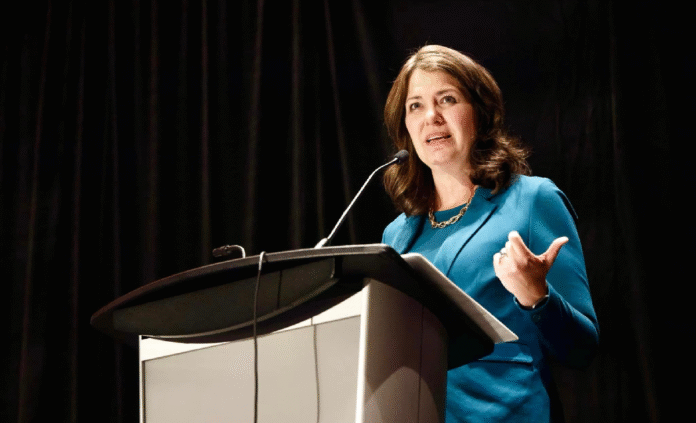
October 31, 2025
RED FM News Desk
Alberta Premier Danielle Smith is calling on the federal government to invoke the Charter of Rights and Freedoms’ notwithstanding clause to overturn a Supreme Court of Canada ruling that struck down mandatory minimum sentences for child pornography offences.
Earlier this week, the country’s top court ruled that the one-year mandatory minimum sentence for accessing or possessing child pornography violates the Charter’s protection against cruel and unusual punishment. The decision gives judges greater discretion to determine sentences on a case-by-case basis.
Smith sharply criticized the ruling, saying the minimum sentence was already too lenient for what she called a “heinous and unforgivable crime.” She urged Prime Minister Mark Carney’s government to act immediately by invoking the notwithstanding clause to restore the mandatory minimum penalties.
“The federal government must stand up for victims and send a clear message that these crimes will not be tolerated,” Smith said in a statement. “The courts are out of touch with public expectations when it comes to protecting children.”
The notwithstanding clause—Section 33 of the Charter—allows federal or provincial governments to override certain constitutional rights for up to five years. It is intended as a political check on judicial authority but is rarely used due to its controversial nature.
Smith’s appeal to Ottawa comes just days after her own government invoked the clause in Alberta to force an end to a province-wide teachers’ strike. The premier said she made that decision because the strike’s scale and duration were causing “significant emotional and educational harm” to students.
Human rights organizations, including Amnesty International and the Canadian Civil Liberties Association, have condemned Smith’s use of the clause as a dangerous overreach that undermines constitutional rights and democratic accountability.
However, Smith has received support from some provincial leaders, including Saskatchewan Premier Scott Moe, who argued that governments must have the ability to act decisively in the public interest.
“The notwithstanding clause exists for a reason,” Moe said earlier this week. “Elected governments, not unelected judges, should have the final say when fundamental public values are at stake.”
The debate underscores a growing national divide over how—and how often—the notwithstanding clause should be used. While some premiers view it as a necessary tool to assert legislative authority, critics warn that normalizing its use could weaken the protections guaranteed by the Charter of Rights and Freedoms.







